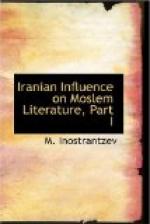“In the year 499 Ak Sunkur was directed by the sultan Muhamed to lay siege to Tikrit which was then in the possession of Kaikobad Ibn Hazarasb (about 1125).” (P. 227.)
[Sidenote: Ibn Mukaffa.]
Ibn Khallikan has devoted seven pages to the life of Ibn Mukaffa who is called the Katib and was renowned for the elegance of his style. He was the author of admirable epistles. He was a native of Fars and a Magian. But he was led to the profession of Islam by the uncle of the two first Abbaside Al Safar and Al Mansur. He then became a secretary and was admitted into intimacy. It was related that Mukaffa went to Isa Ibn Ali and said that he was persuaded of the truth of Islam and wished to make a profession of that faith. Isa answered, “Let it be done in the presence of the leaders and chiefs of the people who come here to-morrow.” On the evening of that very day he went to dine with Isa, and having sat down he began to eat and to mutter according to the custom of the Magian, “How” said Isa, “he mutters like the Magian although resolved to embrace Islam?” To this Makaffa replied: “I do not wish to pass a single night without some religion.” The next morning he made to Isa his solemn profession of Islam. Notwithstanding the eminent merit of Mukaffa he was suspected of infidelity and Al Jahiz states that his religious sincerity was doubted (P. 431). Ibn Kallikan says, “It was Mukaffa who composed the book entitled Kalileh Wa-Dimneh. But some state that he is not the author of the work which they say was in Pahlavi, and he translated it into Arabic, and put it in an elegant style. But the discourse at the beginning of the work is by him.”
VOLUME II.
Ahmed Ibn Yusuf addressed to Al-Mamun a verse with a present of an embroidered robe on the day of Nauruz. (P. 32).
Al-Marzubani received his surname of Al-Marzubani because one of his ancestors bore the name of Al-Marzuban, a designation applied by Persians to great and powerful men only. This word signifies guardian of the frontier, as we learn from Ibn al Jawaliki’s work called Al-muarrab. (P. 68).
A reference to the game of chess which originated in India, and the game of Nerd as invented by the Persian king Ardeshir.
We often come across names like Dhia-ad-Din Abu Said Bahrain Ibn al-Khidr, just as we have Paul Pakiam indicating the bearer of the name was originally Hindu but had adopted subsequently Christianity. (P. 296).
[Sidenote: Nominal converts.]
Abl-Hasan Mihyar Ibn Mirzawaih, a native of Dadam and secretary for Persian language was a Fire-worshipper, but afterwards adopted the Moslem faith. It is said that he made his profession to Sharif ar-Rida who was his professor and under whom he made his poetical studies. It seems, however, the conversion of Mihyar was only nominal. Ibn al-Athir al-Jazari says in his Annals that one Ibn Burhan said to him. “Mihyar, by becoming a Musalman you have merely passed from one corner of hell to another.” “How so?” said Mihyar. Ibn Burhan replied: “Because you were formerly a fire-worshipper and now you revile the companions of our blessed Prophet in your verses.” (P. 517.)




